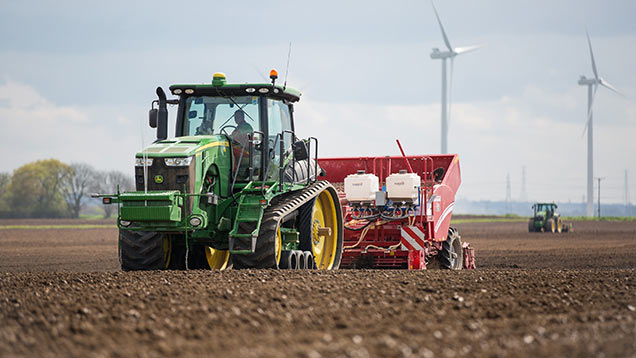New product to help overcome key potato pesticide shortage

An emergency authorisation has been granted for an alternative pesticide for use in potato crops to control potato cyst and free-living nematodes.
An accident at a US DuPont factory at the end of last year lead to a shortage of crucial nematicide Vydate, leaving potato growers short of options to control the key pests.
NEMguard is marketed by Certis on behalf of biopesticide company Ecospray and both are currently working on gathering data to gain full approval for potato crops in the near future.
However, in response to the acute shortages of Vydate, buying group Anglia Farmers approached the two companies and requested an emergency authorisation this season to ease the nematicide shortfall.
NEMguard emergency approval
- Approved: 14 April
- Expires: 11 August
- Maximum dose: 60kg/ha
- Maximum treatments: 1
- Latest time of application: At planting of crop
See also: Pesticide shortage likely after factory’s fatal chemical leak
The granular garlic extract-based product can now be used for in-furrow applications at planting up to 11 August this year and will be just in time for growers unable to source alternative product, with planting well under way.
Certis’ marketing and business development manager Robert Lidstone says the product has proven efficacy against free-living nematodes in carrots and parsnips, where the product has been approved for a number of years.
“The emergency approval provides growers with an alternative this season to control potato cyst nematode (PCN) and enable them to gain confidence in the product while the full extension is applied for.
“Growers who might have had nothing to control these pests with will now have something to work with,” says Mr Lidstone.
Actives
- Mocap – ethoprophos
- Nemathorin – fosthiazate
- NEMguard – garlic extract
- Vydate – oxamyl
Application advice
In manufacturer trials, NEMguard has produced its best results in reducing PCN populations from in-furrow applications and when used on sandy or mineral loam soil types.
It also requires moisture, with rainfall or irrigation required within the first six weeks of application to ensure maximum efficacy.
Peter McDonald, head of procurement of agricultural inputs at Anglia Farmers, also points out that the application rate of 60kg/ha is much higher in potatoes than other root crops.
“As it is a naturally derived product it has no maximum residue levels and only carries a seven-day harvest interval, which makes it an ideal fit for short-term specialty crops such as salads,” he adds.
Yorkshire grower Guy Poskitt, who produces carrots, parsnips and potatoes, has used NEMguard in some fields for free-living nematode control during its development.
Although it has been difficult to quantify the results, he says it has performed on par with Vydate at preventing damage caused by free-living nematodes feeding on his carrot and parsnip crops.
“The formulation is much improved from its early days and it now seems as if they have got it right. Its also competitive on price with Vydate.
“It’s great to see alternative products coming through at a time when we are losing conventional pesticides,” says Mr Poskitt.
In trials
John Keer, independent potato consultant at Richard Austin Agriculture, says the company has NEMguard in trials this year and he is keen to see how the product performs.
However, he urges caution before growers rely solely on NEMguard to protect such a high-value crop against PCN.
“It is very difficult to make the comparison between FLN that casues ‘fanging’ in carrots and parsnips and PCN, which can be so devastating to potato yields.
“I would certainly explore the availability of conventional nematicides Nemathorin and Mocap to make up the Vydate shortfall before turning to NEMguard,” he says.

